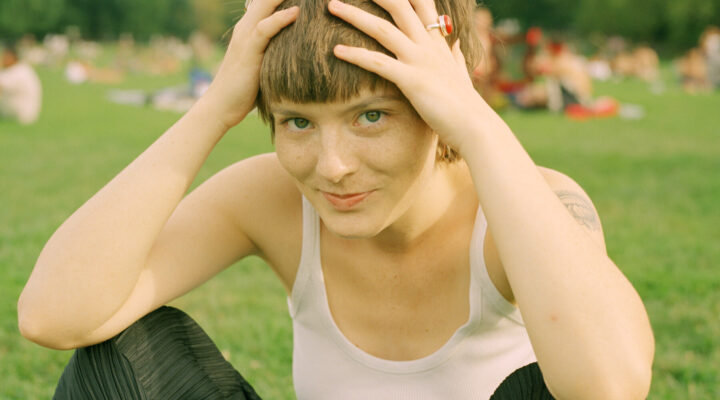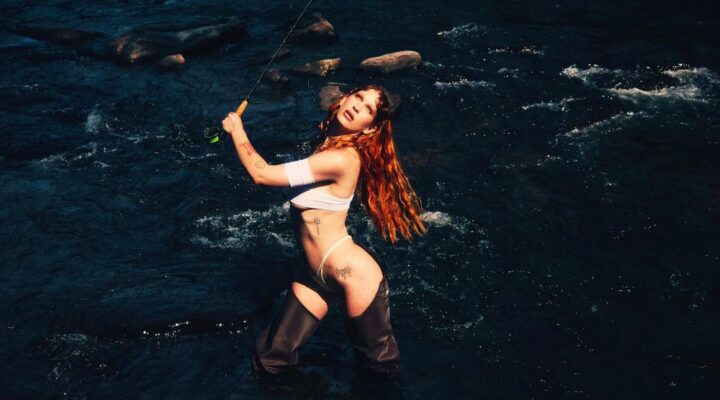Group Rhoda
San Francisco’s Mara Barenbaum makes music as Group Rhoda that often spans contrasts – mechanical and intimate, dark and light, tropical and icy, deconstructionist and celebratory. After two superbly evocative full-lengths over the past two years, spanning references as diverse as Suicide, dub reggae and tropical exotica, we attempted to get to the bottom of what makes her peculiarly robotic creations tick.
Interview by Callum McLean
“I am very open and interested in addressing
the uncertainty of the future”
I had to make a snap description of your music recently and picked ‘lullabies to a lonely self stuck inside a machine’. How do you picture the relationship between the technological and the personal when you record?
Loneliness in its many forms can be a common and indirect theme in my work. I struggle with trying to figure out whether to honour it and indulge in some of the more dystopian ideas that seem to float in my mind or whether it makes more sense to say, ‘Hey life is too short, don’t trouble yourself with anything and just be totally carefree.’ I often feel like progress within and without of myself just moves sideways, and in many respects technology, cloaked in its shapeshifting forms, can also just move sideways. So maybe not so much stuck, but with some kind of inertia and heaviness. How it affects me personally manifests itself in a multitude of conflicting emotions. However, I have decided that through allowing some kind of vulnerability to show through, I am working to re-humanise these strange futuristic processes in effect.
A lot of these ‘futuristic’ processes also seem pretty retro now. You’ve mentioned before a great debt to Suicide and early synth music – how do you see your music with regards to the past, as well as the future?
I can comfortably say that I like older music. I like analogue sounds and I like the moment when active bands and songwriters eagerly and energetically got their hands on synthesizers and drum machines. As for the future, I have no idea what it looks like or even sounds like for that matter. I actually don’t believe that much of anything sonically new will be created, unless we heard more frequencies or saw colors that are imperceivable or new mind altering drugs. Music is always informed from the past, whether knowingly or not. I think the tools become more futuristic and maybe the ways we receive sounds, but not so much the sounds themselves at this moment. So my role within futuristic sound exists more on a social and lyrically thematic level. I am very open and interested in addressing the uncertainty of the future. So maybe its more about the ideas being forward-looking and the sounds drawn from the past.
“Pop music feels like a dangerous mirage to me
and sometimes I just want to clear it all out”
http://bandcamp.com/EmbeddedPlayer/album=2839569085/size=large/bgcol=ffffff/linkcol=0687f5/tracklist=false/artwork=small/transparent=true/
‘Moody exotica’ is an oft-used, neat contradiction to describe your records. How have the more tropical elements of your music worked their way in?
I love exotica recordings. I grew up around Carnival, listening to dub and reggae, world music, and and was involved in a gamelan ensemble for two years. I also find that field recording and fabricated soundscapes are a wonderful way to play with location, weather and possible effecting the mood of a work. Island music and tropical themes have always been something I have found myself magnetically drawn to.
Sounds like a kind of ‘happy space’ – you’ve actually called your music ‘therapeutic pop’ before too. Therapeutic for yourself, or the listener?
It’s therapeutic for me in that writing and practicing come from a sort of naturally motivated place. I cannot speak for others – I once gave a CD to a co-worker who reported back that the music stressed him out too much. So while he is calmly listening to classic rock, it is making me panic. It’s different for everyone and that’s a good thing. I do try to work towards a tone or psychological space within the work, but I am not clear or overly concerned with how it will affect others.
You do clearly have particular (often quite theoretical) ideas for your music then, but there are also plenty of straight-up hooks in your recordings. What’s the difference for you between deconstructing pop and making it?
I like ideas, however, it’s true there are plenty of mechanisms that fall plainly within the realm of pop. It’s the part of me that is attracted to simplicity, melody, soul, and I think is half intentional and half subconscious. I can say that within the current picture of pop music, both independent and mainstream, I sense an increasing shift in ideals sacrificing way too much power to market driven formulas, aggressive advertising, and hype machine-generated work: quantity over quality, sexism, classism, copies of copies, cages inside of cages, walls that build up and close in, with capitalism lurking behind. Pop music feels like a dangerous mirage to me and sometimes I just want to clear it all out. So it’s here that I am interested in deconstructing, with ideas towards music. I feel it is important to act with intention and work with purpose. And the gesture of the project is a bit more raw that the current direction of most pop music.
Group Rhoda headlines the latest The Rest Is Noise at Muziekgebouw aan ‘t IJ, Amsterdam on 30 May, alongside a new audiovisual project headed up by Swedish/Dutch artist Monica Tormell as Moon & Sun. Stream her debut, Out of Time, Out of Touch, on bandcamp.



